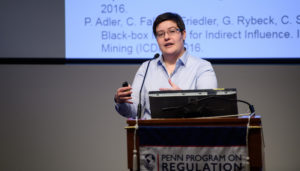
Senate confirms Pompeo as Secretary of State, Court rules Transportation Department cannot delay fuel efficiency rule, and more…
IN THE NEWS
- The U.S. Senate, by a vote of 57-42, confirmed Mike Pompeo, outgoing Director of the Central Intelligence Agency (CIA), as Secretary of State. Senate Majority Leader Mitch McConnell (R-Ky.) said that Pompeo has “earned the trust of the career officers at the CIA, and I am certain he will be an excellent Secretary of State.” In opposition to the confirmation, Senator Bob Menendez (D-N.J.) expressed “lingering concerns.”
- The U.S. Court of Appeals for the Second Circuit ruled that the U.S. Department of Transportation cannot delay the implementation of a rule that would increase penalties for carmakers whose cars do not meet certain fuel efficiency standards. New York Attorney General Eric Schneiderman (D), one of the parties who challenged the delay, called the ruling “a big win for the environment.”
- The U.S. Environmental Protection Agency (EPA) issued a proposed rule that the agency said would “strengthen the transparency of EPA regulatory science.” EPA Administrator Scott Pruitt touted the proposal, saying, “The era of secret science at EPA is coming to an end,” and he stressed EPA’s “ability to test, authenticate, and reproduce scientific findings is vital for the integrity of the rulemaking process.” Former EPA Administrator Gina McCarthy has called this type of action an “effort to cripple the agency” because EPA would not be able “to use studies that include nonpublic scientific data to develop rules to safeguard public health and prevent pollution.”
- Dr. Ronny L. Jackson withdrew his nomination to become Secretary of the U.S. Department of Veterans Affairs (VA). Just before Dr. Jackson withdrew, Senator Jon Tester (D-Mont.) revealed contentions—based on “conversations with 23 colleagues and former colleagues of” Dr. Jackson—that Dr. Jackson had carried out inappropriate “prescribing practices,” had created a hostile work environment, and was drunk on the job. The information “raised serious concerns about” his “temperament and ethics, and cast doubt on his ability to lead” the VA. Dr. Jackson reportedly called these contentions “baseless.”
- The Electronic Privacy Information Center sued under the Freedom of Information Act to obtain unredacted assessments of Facebook’s privacy policies from the Federal Trade Commission. The Center explained that release of the full audits is “crucial for Congress, states Attorneys General, and the public to evaluate how the Cambridge Analytica breach occurred.”
- The U.S. Senate Committee on the Judiciary voted 14-7 in favor of the “Special Counsel Independence and Integrity Act,” a bill that would “ensure independent investigations and judicial review of the removal of a special counsel.” The bill comes in light of the questions surrounding President Trump’s ability to fire special counsel Robert Mueller. Ranking Member Dianne Feinstein (D-Calif.), who voted in favor, praised the bill as a “safeguard against” Mueller “being fired without cause.” Senator Feinstein urged the Senate leadership to present the bill to “the full Senate for a debate and a vote.”
- New Jersey Governor Phil Murphy (D) signed into law the Diane B. Allen Equal Pay Act which “strengthens protections against employment discrimination and promotes equal pay for all groups protected by the New Jersey Law Against Discrimination.” The Act prohibits employers from discrimination against an employee who is a member of a protected class. This action follows a January executive order which prohibited state agencies and officers from asking about or investigating a job applicant’s past wage history.
- The European Commission proposed a regulation “to tackle disinformation online” in light of the “revelations” about Facebook and Cambridge Analytica. Under the proposed “Code of Practice,” online platforms would need to take action to offer “greater clarity about the functioning of algorithms” and help the public “discover and access different news sources representing alternative viewpoints.”
- The U.S. Food and Drug Administration (FDA) announced the release draft guidance for the development of depot buprenorphine, a modified-release product for the treatment of opioid dependence. The guidance specifically addresses “drug development and trial design issues” for the study of depot buprenorphine.
- Senator Mike Crapo (R-Idaho), chairman of the Senate Banking Committee, reportedly sent letters to Bank of America and Citigroup expressing concern with the banks’ recent decisions to cut back on their relationships with gun manufacturers. Crapo reportedly said, “We should all be concerned if banks like yours seek to replace legislators and policymakers and attempt to manage social policy by limiting access to credit.”
WHAT WE’RE READING THIS WEEK
- In a paper for the Wisconsin Law Review, Erin Ryan of Florida State University College of Law argued that “negotiated governance” between federal and state regulators may be the best means of environmental regulation. Ryan explained that negotiated federalism can provide for “effective interjurisdictional governance” given the “need to regulate spill-over harms” in environmental regulation.
- In an article in the Buffalo Law Review, Paul J. Larkin, a senior legal research fellow with the Heritage Foundation, discussed the regulation of marijuana, specifically edibles such as brownies, cookies, and candies that are attractive to children and adolescents. Larkin argued that FDA should “take steps to prevent adulterated and mislabeled edibles from harming the public” by treating marijuana edibles as adulterated foods under the Federal Food, Drug, and Cosmetic Act.
- In a new paper, Mary Bosworth of the University of Oxford Faculty of Law considered “the changing nature of punishment under conditions of mass mobility” in the context of “immigration removal centers” in the United Kingdom. She identified “porous boundaries between” administrative and criminal law and argued that this porousness calls “into question the liberal foundations of punishment” like due process.



